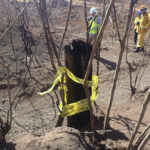A federal appeals court has refused to reconsider its 2014 ruling that BP cannot avoid federal penalties for the 2010 Gulf of Mexico oil spill by blaming another company’s failed equipment.
The 5th U.S. Circuit Court of Appeals voted 7-6 against a rehearing. The court released its ruling Friday.
BP was majority owner of the Macondo well, where the leased Deepwater Horizon rig exploded. BP and minority partner Anadarko had argued they should not face federal Clean Water Act penalties because the oil leaked not directly from the well but from the broken underwater riser that had connected the well to the rig owned by Transocean Ltd. A district judge and the appeals court disagreed.
A trial is set for later this month to determine Clean Water Act penalties. U.S. District Judge Carl Barbier already has found that the oil giant acted with “gross negligence” in the tragedy, a ruling that could mean some $18 billion in Clean Water Act penalties. Other factors include disputed estimates of how much oil spewed into the Gulf before the Macondo well was capped.
The explosion killed 11 workers and sent millions of gallons of oil spilling into the Gulf.
The liability issue involved in the decision released Friday dealt with wording in the Clean Water Act and how it applied to the oil that spewed into the Gulf as a result of the 2010 disaster. The 5th Circuit’s first ruling in June 2014 concluded that the well fit the definition of what the act calls a “facility from which oil or a hazardous substance is discharged,” and that it was “immaterial that the oil flowed through parts of the vessel before entering the Gulf of Mexico.”
The majority on Friday added nothing to the original ruling. There was a dissent written by Judge Edith Brown Clement on behalf of the six judges who wanted to grant a rehearing. Clement said the fact that the oil moved through the rig’s failed blowout preventer and riser before entering the Gulf was an issue. The well, she added, was not designed to confine the oil.
BP declined comment. Anadarko did not immediately respond to a telephone call seeking comment Friday evening.
Was this article valuable?
Here are more articles you may enjoy.

 Viewpoint: The Impact of Behavioral Health on Workers’ Comp
Viewpoint: The Impact of Behavioral Health on Workers’ Comp  Hawaiian Electric Hits 40-Year Low Ahead of Maui Fire Report
Hawaiian Electric Hits 40-Year Low Ahead of Maui Fire Report  US Eyeing Ship’s Electrical System After Baltimore Bridge Crash
US Eyeing Ship’s Electrical System After Baltimore Bridge Crash  Property Restoration Industry: A Culture in Need of Repair?
Property Restoration Industry: A Culture in Need of Repair? 